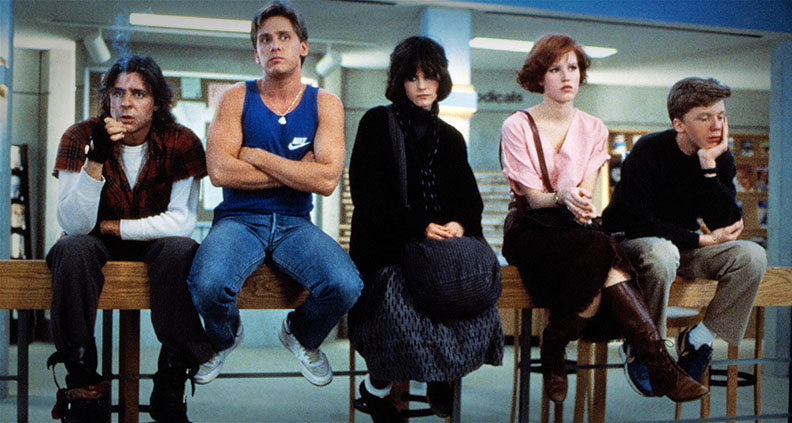Undercover Indies: How ‘The Breakfast Club’ Went Small-Scale and Created a Cult Classic
For most people, the most widely accepted definition of “independent film” is any sort of movie made outside (or largely outside) the Hollywood studio system. Many of our most critically acclaimed and important films have been indies, yet too often the average moviegoer has no clue that what they’re watching has been made through means different than the typical blockbuster. With Undercover Indies we hope to shine a light on some familiar film titles that you may be surprised to learn are actually—surprise!—independent productions.
1985’s The Breakfast Club is a quintessential coming-of-age story about a five students who believe they have nothing in common, defined in the film as a “Princess, Athlete, Criminal, Brain and Basket Case.” Or, in more modern terms: Prep, Jock, Stoner, Nerd and Misfit. They do, however, share the fact that they’re all stuck in Saturday detention together. Trapped over the course of one long day, the fivesome eventually comes to discover that they have much more in common than initially suggested by their superficially disparate cliques.
Although many would argue that Breakfast Club writer/director John Hughes’ influence is forever confined to the 1980s, the late auteur’s interpretation of modern American teenagerdom has managed to transcend subsequent generations to achieve iconic status. The high school stereotypes Hughes challenged in The Breakfast Club are the same that I myself would encounter at school over 20 years later—and that, I think it is safe to say, kids are still encountering today.
Why you don’t think it’s an indie.

The Breakfast Club is an absolute film staple. If anyone claims not to have seen it, it’s guaranteed to come as a shock. This is the kind of movie you’re bound to come across at some point in your life without even trying—probably several times. And although they don’t have quite the star power that they once did, in the mid-‘80s Breakfast Club stars Emilio Estevez, Molly Ringwald, Judd Nelson, Ally Sheedy and Anthony Michael Hall were all at the absolute height of their fairly long-lasting fame. Writer David Blum dubbed the actors (as well as other popular young movie stars of the time, such as Rob Lowe and John Cusack) the “brat pack”—a term which is still tossed around when referring to them today.
The movie is universally beloved, with a whopping 91% fresh Rotten Tomatoes score, and many reminiscent articles and appreciations still floating around the web.
Even the film’s soundtrack is iconic. The Breakfast Club came out in February 1985 and the song “Don’t You (Forget About Me)”, performed by Simple Minds and written exclusively for the film, reached the top of the American Billboard charts by that May.
Why it is an indie.

Although Universal Pictures is technically partially credited as one of the production companies of The Breakfast Club, the much smaller A&M Films and Channel Productions were its primary producers.
The film was made on what would be considered a shoestring budget for such a successful feature—a measly one million dollars. Even in the mid-‘80s that price tag was astonishingly low. This was partially possible because the film was shot at only one location. The cinematographer, Thomas Del Ruth, has confirmed that the production “never left the premises. It was faster that way.” The film was quick to make and therefore required fewer days to pay cast and crew, fewer permits, fewer transportation costs and—obviously—a lot less location scouting. They may be out there, but I personally can’t think of a single big studio blockbuster of The Breakfast Club’s impact that’s been shot all in one location—a pretty impressive feat by Hughes and his collaborators.
Additionally, the content of The Breakfast Club has a more typically “indie” tone and story themes. Namely: young people pushing back against the identities society has imposed on them and finding unlikely partners (along with their true selves) in nuanced, communicative ways.
Even though the movie is now fairly adored, not all critics were crazy about the The Breakfast Club in 1985. Some have admitted years later to not appreciating the film sufficiently upon its original release. Like Van Gogh and many other great works of art outside of the mainstream, The Breakfast Club only asserted its creative innovation and lasting cultural influence with time. Even the film’s famous “Don’t You (Forget About Me)” end-of-the-film-fist-pump-jam wasn’t initially appreciated. Several artists had already turned the soundtrack spot down, and it was only after much internal debate that Simple Minds reluctantly agreed to record the song. But seeing as it was the group’s only US hit, something tells me they didn’t regret it.
The Breakfast Club is the indie film version of the American dream—a startup entity that began with the odds stacked against it and barely any money; which, despite all obstacles, turned in to a lasting cinematic success story. This film is at once archetypal and subversive, with just the right amount of sentimentality to leave a sweet taste in your mouth without overwhelming you with kitsch. John Hughes did—without major studio resources—what every filmmaker dreams of doing: he created a classic.
NOTE: a version of this blog originally ran in 2016, authored by Film Independent blogger Kaia Placa. It appears in a revised version here. Special thanks to Kaia.
Film Independent promotes unique independent voices, providing a wide variety of resources to help filmmakers create and advance new work. To support our efforts with a donation, please click here and become a Member of Film Independent here.